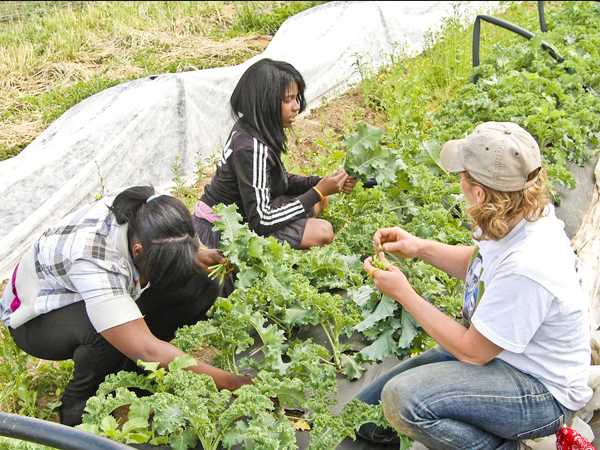 Weaver’s Way helps start high school farms
Weaver’s Way helps start high school farms
by Andrew Thompson
On a May afternoon at Martin Luther King High School in East Germantown, several students tilled compost onto one of the many mounds being readied for sowing. Along with their stewards from nearby Weaver’s Way Co-op and the Philadelphia Orchard Project, they had just finished harvesting some of the kale and collards planted in April at the farm the school runs with Weaver’s. The one-third-acre farm and its adjacent greenhouse sits just south of the King’s soccer field and overlooks bustling Stenton Avenue.
Freshman Tiffany Jackson, 18, bobbed back and forth rhythmically as she smoothed the compost over the hump, preparing it for bell peppers. “I gonna rock wit’ it, gonna lean wit’ it. Rock you so damn hard you break yo’ spleen wit’ it,” she rapped as she moved the rake over the mound.
Rapping and farming. To the students at MLK, the incompatibility of the two at one point seemed self-evident. Farms were in the country and tended by country music-loving farmers, not by metropolitans in underused urban nooks. But along with the more obvious goals of the farm, like providing food for the local community and teaching kids that corn chips don’t spring up from the ground in bags, overcoming the disconnect between the urban and the country is a fundamental adjustment for students. Teaching kids that urban farms are not only possible, but also practical, can plant seeds for expanding local food production in Philly down the road.
That lack of awareness is more understandable at MLK than it is at Andorra’s agricultural specialty school, Saul High School, Weaver’s Way’s other educational partner. Saul, whose pastoral environment partially populated by cows can make one easily forget that they’re in a city, is the only high school in the state certified to teach food science. The farm the students work on is a community supported agriculture plot, meaning that buyers pay for food ahead of time and receive it after it’s harvested. Students I spoke to said they had never heard of community supported agriculture before the Weaver’s Way program, and hadn’t given much thought to urban farming, either.
“Before I came here, I thought of farming and I thought of out in the middle of nowhere and you have all these crops and animals by the thousands and everything,” says Saul student Ryan Wilgenkamp, 17. “But now I see that it can survive in a city. It’s kind of changed my perspective that it can survive anywhere, you just gotta try.”
The number of co-ops in Philly has declined from the ’70s heyday of 24 to exactly two today (Mariposa in West Philly is the other). But despite co-ops’ scarcity, the farms at Saul and MLK are outgrowths of a demand for more. Weaver’s Way began its first volunteer-run urban farm at the Awbury Arboretum just south of MLK in 2000 as a sort of prototypical exhibit of what farms in cities could be. In 2006, the company’s customer-base had grown enough to fund an entire Farm Department, which allowed it to pay for a farm manager. The growth continued (to a sometimes stifling point inside the actual co-ops; one employee told me that “it can be hard to move”) and last year Weaver’s Way partnered with education nonprofit Foundations Inc. and food-based nonprofit Seeds for Change to open up the farm at MLK and afford salaries to its student keepers. With enough money to pay for staff, Weaver’s Way decided to partner with Saul to open their farm in April this year, as well as create a much smaller set-up for the Stenton Avenue Homeless Shelter, which teaches residents to grow their own food.
Even at Saul, where a farm would seem as integral to education as textbooks, it’s taken the partnership for the school to even have its own farm. Before Weaver’s Way approached Saul, “I think [this farm] was just grass; I don’t think they were using it,” says Weaver’s Way director of communications Jon McGoran as he looks out across the rows of vegetables. Past offers from organizations who wanted to set up the land as a farm had tinges of exploitation, says Jess McTammany, a teacher at Saul.
“We get a lot of people who want our labor, but don’t want to teach our kids,” she says. But with Weaver’s Way, “we become a part of the process instead of just the force behind the process.”
The students at Saul are at least acquainted with the horticultural process (“You only need one row to show kids how to seed,” says McTammany). For the MLK students, watching a seed become food can be somewhat of a breakthrough, and their astonishment at such a basic phenomenon raises questions about whether at least cursory study of the food process shouldn’t be mandatory in schools. “Everyone eats” has become a sort of battle cry for the local food movement, and its universalist tone resembles the thinking behind much of the curriculum of early and adolescent education. Everyone is bound by the laws of science and mathematics; everyone is part of the human experience described in literature; everyone lives in a present inherited from history.
“I try to peg what we do to some [mandated] standard,” says Ted Moynihan, an English teacher at MLK who utilizes the garden for his classes. “But at the end of the day, what we do here is so important that taking one hour out of the week that doesn’t directly relate to becoming a better writer or becoming a better reader I think is more in line with my view of what education should be, which is helping them make better choices and understand the world around them.”

